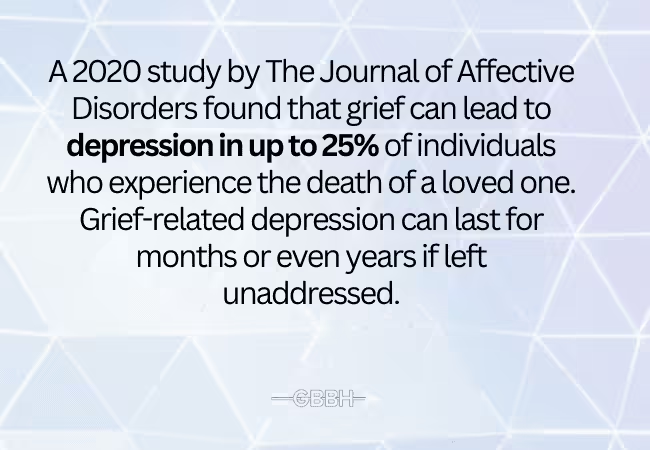Grief is an intensely personal and frequently overwhelming feeling. While each person’s experience with grief is unique, one fundamental reality remains: it can be extremely difficult to face alone. The grief of losing a loved one, a treasured dream, or even a career can rock us to our core, leaving us feeling isolated and helpless.
However, during an emotional storm, seeking grieving support can be a crucial step towards recovery. In this blog, we will look at why seeking help during a time of sorrow is so important, and how it can help you find your way back to serenity and recovery. Let’s begin!
Understanding Grief’s Complexity
Grief is more than just sadness; it is a complicated combination of feelings that may include anger, remorse, relief, anxiety, and even uncertainty. These powerful sentiments can vary in intensity and occasionally arise unexpectedly. This complexity contributes to the difficulty of grieving.
The good news is that mental health treatment programs in Boston offer various therapies designed to help individuals process their grief in healthy ways. Seeking professional help can be one of the most beneficial steps toward healing and finding peace again.
Benefits of Seeking Help for Grief
1. Reducing the Sense of Isolation
When we are grieving, we may feel isolated from the rest of the world, as if we are separated by an invisible wall. Friends and family members may not fully understand the gravity of our suffering or may be uncomfortable discussing loss.
This can make us feel isolated. Finding support, whether through therapy or a community support group, can help close the gap. Sharing your stories with others who understand sorrow can help you connect and feel less lonely, reminding you that you are not alone on your journey.
2. Providing a Safe Space to Share
For many people, grief evokes difficult emotions. The fear of bothering loved ones or being misunderstood might make it tough to open out. A therapist or grieving support group offers a safe, non-judgmental environment in which you can express your full range of feelings without fear.
This secure setting allows you to express your sadness, memories, worries, and even regrets, which can be an important part of the grieving process. Putting sentiments into words is sometimes enough to bring about release and relief.
3. Developing a Sense of Routine and Stability
Following a big loss, life can become chaotic, as if the ground beneath your feet has moved. Therapy and support systems can provide structure and stability, serving as a trustworthy anchor during festive times. Whether it’s a weekly group meeting or regular therapy sessions, knowing you have a defined time to process your emotions can be reassuring. Regular support might help you gradually rebuild habits and regain a sense of normalcy.
4. Respecting the Memory of Your Loved One
Grief support can help us recognize and remember people who have passed away in meaningful and beneficial ways. Therapists and counselors frequently recommend memorial rituals such as journaling, producing art, or developing routines to honor your loved one’s life. This concentration can transform mourning into a source of inspiration and love, allowing you to carry your loved one’s memory in a way that is comforting rather than painful.
The Role of Therapy in Grief Support
While grieving is a personal experience, therapy provides the tools, support, and space needed to work through your emotions. At Greater Boston Behavioral Health, we offer several therapeutic approaches that can be particularly effective for those experiencing grief, including Cognitive-Behavioral Therapy in Boston and Dialectical Behavior Therapy in Boston.
Cognitive-Behavioral Therapy (CBT)
CBT Therapy in Boston helps individuals identify and change negative thought patterns that may be exacerbating feelings of grief. Through CBT, you can learn to reframe your thoughts, challenge distorted thinking, and adopt healthier coping mechanisms. By learning how to manage your thoughts and emotions, CBT can help alleviate the emotional burden of grief.
Dialectical Behavior Therapy (DBT)
Dialectical Behavior Therapy in Boston focuses on teaching skills such as emotional regulation, mindfulness, and distress tolerance. DBT is especially helpful for those who struggle with intense emotions and difficulty managing overwhelming feelings of sadness or anger. It offers practical tools for navigating the emotional rollercoaster that often accompanies grief, helping individuals develop resilience and emotional stability.
Trauma-Informed Therapy
For individuals whose grief is complicated by traumatic experiences, such as the sudden or violent loss of a loved one, trauma-informed therapy helps address the emotional and psychological wounds left by these events. The goal is to provide a safe environment for healing and to process painful emotions in a healthy way.
When to Seek Professional Help for Grief
Grief is a personal experience, and the duration and intensity of the emotions vary from person to person. However, there are certain signs that may indicate it’s time to seek professional help for grief:
- Prolonged or Intense Grief: If feelings of sadness, hopelessness, or despair persist for weeks or months, it may be a sign of complicated grief. This condition can significantly impact daily functioning and may require professional support.
- Difficulty Moving Forward: When grief prevents a person from engaging in their normal activities—such as going to work, maintaining relationships, or taking care of daily tasks—it can be a sign that they need help to process their emotions and find a way to heal.
- Physical Symptoms: Grief can manifest in physical symptoms, including sleep disturbances, changes in appetite, and fatigue. If these symptoms become overwhelming or persistent, therapy can help manage the emotional and physical impacts of grief.
- Social Withdrawal: If you or a loved one is withdrawing from social interactions and isolating themselves, it may be a sign of prolonged grief or depression. Therapy can offer a supportive space to reconnect with others and address underlying emotions.
- Anger or Anxiety: Intense anger, anxiety, or panic attacks following a loss may signal that grief is being experienced in a way that could benefit from therapeutic intervention. Therapy can help individuals understand and manage these emotions constructively.
Looking for Support? Join Hands with GBBH!
Are you navigating the hardships of loss and looking for a supportive community? GBBH is here to provide you with the insight, support, and resources you need to go forward. At GBBH, we believe that no one should go through sorrow alone. Our support groups, individual therapy, and resources are intended to provide a secure environment in which you may share your experiences, connect with others, and gain strength together.
Why Greater Boston Behavioral Health?
At Greater Boston Behavioral Health, we offer a range of mental health programs in Boston tailored to meet the unique needs of each individual. Our team of compassionate therapists is trained in various evidence-based therapies, including CBT Therapy in Boston, DBT Therapy in Boston, and anger management in recovery. Whether you are struggling with grief, anxiety, or other emotional challenges, our behavioral health in Boston services are designed to provide the support and tools you need to heal.
If you or someone you know is experiencing the overwhelming effects of grief, don’t hesitate to reach out. Therapy is a powerful tool for healing, and with the right support, you can regain your emotional balance and find peace once again.
Conclusion
Grief is an incredibly personal and often painful experience, but it doesn’t have to be faced alone. Whether you are struggling with sadness, anger, or feelings of being stuck, Greater Boston Behavioral Health offers a range of therapeutic approaches, including Cognitive-Behavioral Therapy (CBT) and Dialectical Behavior Therapy (DBT), that can help you process your grief and begin to heal. Seeking professional help is a proactive and essential step toward emotional recovery, allowing you to move forward in a healthier way. Take the first step today and reach out to us at (888)278-0716 and invest in your mental wellness –you deserve it.
FAQs About Grief and Therapy
How long does grief therapy take?
The length of therapy varies depending on the individual and the complexity of their grief. Some people may feel relief after a few sessions, while others may require ongoing support over several months. Your therapist will work with you to determine the best course of treatment for your specific needs.
Is it normal to feel angry while grieving?
Yes, anger is a common emotion during grief, especially if a person feels that their loss was unfair or if they’re experiencing a sense of helplessness. Therapy can help you process this anger and learn healthy ways to express and cope with it.
Can therapy really help me move on from my loss?
Therapy won’t erase the pain of a loss, but it can provide you with tools to process your grief, find emotional balance, and adjust to life after loss. The goal is not to “move on” but to find ways to live with the grief in a healthier way, integrating it into your life while finding hope and purpose.
What is the difference between normal grief and complicated grief?
Normal grief involves sadness, anger, and pain, but over time, these emotions generally decrease. Complicated grief, on the other hand, involves intense, prolonged grief that interferes with daily life and does not lessen over time. If your grief is preventing you from functioning or healing, it’s important to seek professional help.
Can group therapy help with grief?
Yes, group therapy can be extremely beneficial for people grieving. It allows individuals to share their experiences with others who understand their pain, providing support, validation, and a sense of community. Many people find comfort in knowing they are not alone in their journey through grief.


